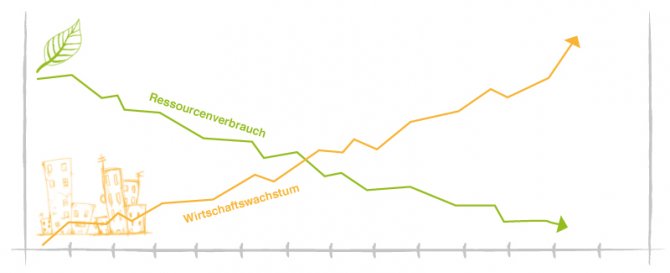Economic dimension
Efficient treatment of resources, workplaces and stability
Sustainable economic activity is closely connected with the two remaining dimensions. Economic sustainability is linked to the ecological dimension, for instance in relation to economical use of resources and energy, as well as with the social dimension, for instance through creation and safeguarding of workplaces. Two central concepts, which describe the nature of sustainable economic activity, are therefore efficiency and stability.
Sustainability and enterprises
Enterprises are the organizational units for implementation of sustainable strategies on a micro-economic level. Sustainable economic activity is associated with:
- Mobility: carriage of goods, business trips, sustainable management of vehicle fleet etc.
- Consumption of resources: sustainable production, technical innovation, quality
- Work: new models of working hours, CSR, inclusion of disadvantaged persons
- Products: quality instead of quantity, long product lifespan, regional products, environment-friendly or renewable raw materials
Enterprises are able to make a considerable contribution towards a more sustainable society through their orientation and activity. However, they are considerably dependent on the wishes of consumers, who often prefer “cheap products” to “more sustainable” products. The market by itself therefore cannot lead to sustainability, because CSR measures may afford advantages for single enterprises, the bulk, however, produce in the most cost-efficient way. As the market pays insufficient attention to external factors, such as destruction of the environment, political management systems are required which regulate these concerns by law in favor of the community (environmental specifications, taxes, fines, preferential treatment etc.).
Tip for this topic: The story of Stuff
Renunciation of the paradigm of growth – beyond GDP?
On a macro-economic level, i.e. society as a whole, the discussion about a sustainable future reaches up to the challenge of current economic paradigms. The current politico-economic approaches aim at a stronger growth of economy than consumption of resources, designated as a relative decoupling. If an absolute decoupling can be reached – increasing growth of economy, at the same time decreasing consumption of resources – is doubted, at the same time taken as a necessity by many researchers of sustainability. Therefore, also departing from the paradigm of growth is considered, for instance within the framework of the initiative of “Beyond GDP”.
“Austria as a dynamic business location“
The Austrian Strategy for Sustainable Development mentions the following topics under the aspect of economic sustainability: fostering innovative structures for competitiveness, correct prices for resources and energy, successful economic activity through eco-efficiency, promoting sustainable products and services. Central targets are, amongst others, strengthening of entrepreneurial responsibility and increased disassociation (decoupling) of consumption of energy and resources and economic growth.
Economic sustainability and socio-ecological production
Socio-ecological production regards itself as a comprehensive form of sustainable economic activity. Through targeted promotion of sustainable high-quality products and services, this project affords a contribution towards saving of resources. Fostering regional instances of cooperation helps cutting down on transport distances, production in occupational projects qualifies and integrates disadvantaged persons and supports safeguarding of workplaces. goodworks strengthen regional value creation, as well as small and medium-sized enterprises, and can contribute towards better use to capacity and increase in efficiency of (largely or) partly publicly financed social enterprises. Finally, they encourage private economic enterprises to actively assume social responsibility.

